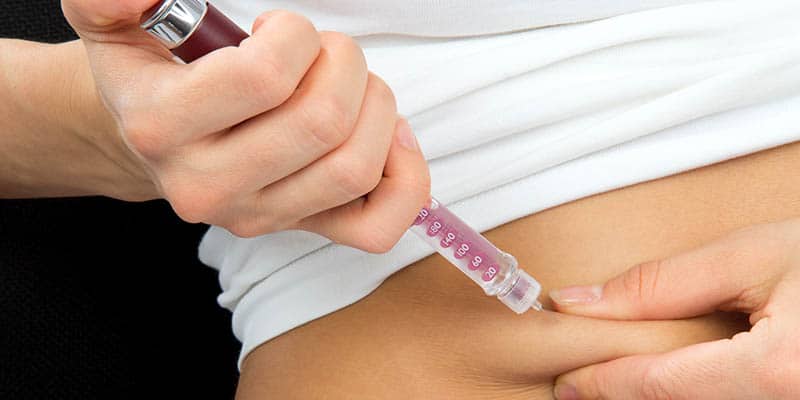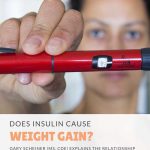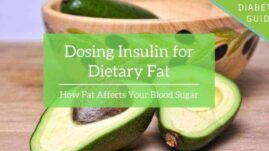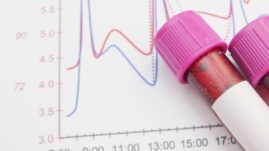Insulin is the most potent and effective treatment for elevated blood glucose levels.
Everyone with type 1 diabetes needs insulin to stay alive, and millions of people diagnosed with type 2 diabetes require insulin to control their blood glucose levels.
However, even insulin is not without its side effects. One of the most common concerns expressed by people who use insulin is that it tends to cause weight gain.
Multiple studies have shown that the average person with type 2 diabetes gained up to 3 pounds (1.4 kg) in their first year of insulin use, with 10 percent gaining more than 5 pounds (2.3 kg).
Since achieving and maintaining a healthy weight are important for everyone with diabetes, let’s discuss why this happens and what can be done about it.

Why does insulin cause weight gain?
Insulin is a hormone that promotes the uptake of sugar (glucose) by almost all of the body’s cells, including muscle, liver, and fat cells.
At any given time, our cells are also burning glucose for fuel. If our fuel intake (calories eaten) is greater than our energy expenditure (calories burned), we tend to store more glucose than we burn.
Muscle and liver cells store this extra glucose in a form called “glycogen”, which is a very dense, compact form of glucose. Fat cells store the extra glucose as fat.
High blood sugars and a lack of insulin cause our weight to be artificially low. When diabetes is not well controlled, blood glucose levels are too high. This means that there is not enough insulin to store all of the food we consume.
When our muscle, liver, and fat cells are unable to take in all of the glucose from the food we eat, an unnatural form of weight loss takes place.
When blood glucose levels are particularly high, some of the excess glucose passes into the urine, which causes excess urination. In other words, we literally “pee away” some of the food we have consumed. This can cause artificial weight loss in the form of both water and energy.
We may still be consuming more calories than we burn, but since many of the calories are urinated away, we weigh less than we really should.
Once insulin therapy begins and blood glucose levels come down towards normal, the excess urination and loss of glucose through the urine stops. Our cells resume storing all of our food in the form of fat or glycogen, and our weight returns to a level that is appropriate for our food intake and calorie expenditure.
In other words, insulin simply restores healthy blood glucose levels and allows us to weigh what we should based on our diet and exercise patterns.
What’s the point of using insulin if it just makes me gain weight?
If you live with type 1 diabetes or have reduced insulin production, you need to take insulin to survive. You simply don’t have a choice.
Also, insulin is the most effective way to get blood sugar levels down to normal, and normal blood sugars are essential for making the kind of lifestyle changes that will ultimately help you lose body fat and maintain a healthy weight.
Elevated blood glucose levels tend to make people tired and lethargic. It is not easy to exercise when you feel that way! Lowering blood glucose levels can restore your energy and give you the strength and attitude to maintain an active lifestyle.
High blood glucose can also make you feel hungry. Keeping your blood glucose near normal will allow you to better manage your food intake, particularly the consumption of high-calorie sweets and other snacks.
In other words, gain a little today to lose a lot tomorrow.
How can I keep myself from gaining too much weight when I use insulin?
Accept the fact that with insulin use and lower blood sugars, there is a tendency to put on some initial weight. So how can you keep yourself from gaining too much? Here are a few ideas:
Avoid hypoglycemia (low blood sugar)
If you are experiencing any low blood sugars (typically defined as a blood glucose of less than 70mg/dl), talk to your healthcare team about cutting back on the insulin that is working when the lows are taking place.
Likewise, if you need to eat to prevent low blood sugar, you may be taking too much insulin.
Not only does low blood sugar require you to eat food that you typically would not consume, but it also indicates that you are overinsulinized – taking more insulin than your body needs. Excess insulin will promote the buildup of fat stores and excessive weight gain.
Reduce doses whenever possible
Along the same lines, look for every opportunity to reduce your insulin requirements. Cutting back on carbohydrate intake is one way to accomplish this.
Eliminating carbohydrate-containing drinks is a good place to start. So is cutting out between-meal snacks.
At mealtimes, reduce your portions of carbohydrate-rich foods such as potatoes, rice, bread, pasta, and cereal. Instead, increase your portions of lean meats and non-starchy vegetables.
Physical activity can also help lower your insulin requirements by enhancing how well your insulin works. Extra walking throughout the day may allow you to reduce your dose of long-acting (or “basal”) insulin.
Moderate exercise after meals may allow you to significantly reduce your rapid-acting mealtime (“bolus”) insulin. Talk to your healthcare team about making these kinds of adjustments.
Also, look for ways to cut back on your stress levels. Emotional stress makes your body resistant to insulin. Learning to relax can go a long way towards reducing your insulin needs. It can also put you in the right frame of mind to eat and exercise the way you should.
Make lifestyle adjustments
Stress reduction, physical activity, and healthy eating all help you to lose weight. And weight loss, in turn, helps your insulin to work better!
When insulin works better, your insulin needs go down, which helps you to lose even more weight. What a beautiful cycle!
One of the best ways to start on the road to a healthier lifestyle is to meet with a registered dietitian with expertise in both diabetes and weight control. Meal planning guidance and education have been shown to reduce insulin-related weight gain.
Medicate Wisely
When using long-acting insulin, 24-hour “basal” insulins such as glargine or Levemir tend to produce less weight gain than intermediate-acting insulin such as NPH.
There also tends to be less hypoglycemia with the 24-hour basal insulin, which as stated above, is beneficial in terms of weight control.
The use of an insulin pump can also eliminate unnecessary insulin doses, and usually results in a 10-20% reduction in total insulin usage while improving blood glucose control.
Many people take another diabetes medication along with their insulin to help reduce the required doses.
Insulin-sensitizing agents such as rosiglitazone or pioglitazone can help reduce insulin requirements.
Metformin reduces the body’s natural secretion of glucose into the bloodstream, which can also reduce insulin needs.
Pramlintide, an injectable medicine, helps to slow digestion, blunt appetite, and block glucagon secretion, often resulting in reduced mealtime insulin requirements.
And exenatide, another injectable medicine, helps to improve insulin sensitivity and enhance the body’s own insulin production after meals.





dave
Man made insulin has side effects such as weight gain. I have followed a low carb, gluten free diet for over 10 years. I have been a long time runner for over 30 years and prefer to walk where I need to go within reason. When I started insulin therapy I gained 15 pounds in a month. I was not overweight or obese when I was diagnosed with LADA in 2010 and I eat fairly clean. Had not had a soda since 1991 and don’t do sweets except during the holidays. I think weight gain is a major side effect of man made insulin even if you are eating a low carb clean diet.
kelly
I see this thread is from a few yeara ago but I am in the same predicament as everyone who has commented. I was diagnosed with Type 2 a little over a year ago and A1c at 14+ and at the time my fasting sugar was 378 which made my doctor flip out. I didn’t understand how dire this was until I read about it because she called me with the results and told me I was going on meds, and just that that number was quite high. She put me on Metformin 500 mg twice a day and insulin 20 a day. I am 5 ft. 1 inch tall. I have lost considerable muscle from before I had my hip replaced. I weighed 90 pounds when diagnosed. My A1c was 7 three mo. later, and down to 6 three months later and then 5.5 three months later. They decreased my insulin to 15 and then 10. Meanwhile I gained 30 pounds…. so from 90 to 120. (good news was that cholesterol went from 220 to 196 without medication or me thinking about how to drop it)
My whole life I had a pot belly and after I was 45 I had gained weight – eventually I reached 175. I dieted for *7* years to take that off. I guess I was about 120 when the diabetes took hold because the last of it came off in about a year and I am a sloooow loser. So that was fast for me.
The insulin has caused the weight gain of 30 pounds and I can’t stand it.
Due to the weight gain I am back to the “belly profile” in the mirror and I loathe it. I feel bad about myself. Really bad. I hate the mirror. Clothes that I was thrilled to look good in will no longer fit. I am about to be out of my biggest jeans, which have a 31 waist (they are mid-rise). Although I was horribly underweight at 90 I want to be about 108, giving me a little room to go up if that happens and not regain the pot belly.
I was told that any insulin amount above my need for it to keep blood sugar down would cause me to gain. I took that to heart. I cut the insulin to 5 and watched the diet like a hawk, and now I have it at 3 units a day. It seems to be working ok because blood sugar is averaging about 115 in the morning. Of course the ridiculous meter can go up or down 15 points in tests 2 seconds apart, so who knows for sure. But at 3 units of insulin a day my weight is dropping one or two tenths of a pound at a time. As of yesterday I added walking outside to my day. I have to walk on 2 canes and very slowly but at least it is walking. I have neuropathy – numbness in my legs and feet so I have to be careful how I place my feet, and my legs are still very very weak. I go to PT twice a week. Stopped the evening snacks which is where my carbs were mostly coming from. I do like to snack at night but now – getting the belly gone is far more important.
Concluding – for ME, not everyone, wanting to have lower sugar and less insulin has to be so strong that you’re willing to give up carbs at dinner, sandwiches, morning toast (I switched to liquid egg white cooked in the microwave and 1 pc of bacon), chips, ice cream, crackers, soup with potatoes in it, and have just meat and non-starchy veggies at dinner, etc. Doing this allows a very small carb snack in the evening (my reward). You have to read every label and if it says 2 little waffles are 28 grams of carbs, compromise and have 1 for 14 grams. But normally I wouldn’t have that waffle at all. Having it today means no snack tonight. I get extra protein from Whey when I remember to take it. I am watching my protein grams – I need about 60 a day, so I have meat at lunch and dinner.
I told my doctor what I’d done and she didn’t tell me not to do this reduction in insulin. I doubt I’ll ever get along with no insulin so now it may be a matter of adding exercise, then more exercise as my physical condition permits. I am very limited in what I can do physically.
Christel Oerum
Sounds like you’re doing what’s right for you!
Mum of T1
Hi, thanks for this article. My daughter (6years old) is T1 & I would like to develop healthy habits for her. I like the idea of some exercise after meals. What do you mean by “moderate exercise”. Would a short walk around the block be sufficient? Would it need to be a brisk walk or would just getting up & moving for a slow walk work? Thanks!
Christel Oerum
Oh, that’s an excellent question. Basically everything counts and walking is a great way of getting in daily activity. Generally, moderate aerobic activity is defined as activities such as brisk walking, swimming or biking while vigorous aerobic activity would be activities such as running or aerobic dancing
M-anonymous
I’ve recently been diagnosed with Type 1 diabetes and it’s caused me to gain nearly six kilos in the span of only a few months. It’s been discouraging to see the numbers on the scale rise and feeling hopeless, as, no matter what I do, it won’t go down. I had resorted to not taking insulin for a few months to go back down but my A1C levels were too high and I knew it was dangerous. Now that I’m back on my required amount of insulin, I’ve put on the weight again. Any advice??
Christel Oerum
Have you read through our “How to lose weight with diabetes” guide? I think that will answer all of your questions. And please know that weight loss takes time. It might even take a little longer when living with diabetes, and I know it’s frustrating, but it can be done. With a good plan and patience
Kelly hodgkinson
Is it possible that you are eating to many carbs? Some people including myself are very sensitive to carbs causing weight gain.
Bill
Hello, I have been a Diabetic for 25 years now. Before taking insulin I was always a thin guy. Now I am always struggling to stay under 300 lbs. The weight is all in my stomach. Its embarrassing, and I blame it all on insulin. I was put on a couple of newer insulin medications, like Victoza, and they helped me get to about 270 lbs, however I could’nt accept the side effects of feeling hung over all the time. I take 20-25 units of insulin at every meal and also 75 units of toujeo at night. My last A1C was 7.3. Does anyone know the solution to stopping insulin from keeping me overweight?
Christel Oerum
Have you tried tracking your food and paying attention to your calories for a period of time? The only way to lose weight and keep it off (which also applies for us on insulin) is to manage our caloric intake.
I’d also recommend you address your insulin resistance by including resistance training into your routine.
I know this is tough, but try looking around on the website, we have a lot of free resources you can use to achieve your goal. If you need custom support I also offer coaching
Ness
Hi there, i have been diabetic for over 10 years and didnt look after my self as i hated being controlled by this illness. I spent 3 months in hospital 3 operations and eventually quarter of my left thumb amputed, im a young 49 year old woman. To all out there diabetes doesnt go away, i now am on insulin twice a day and have put on weight ,but am slowly taking control and have been averagering 6-7 blood sugar levels. I appreciate blogs such as this one as i dont get the best in information from dr.
Christel Oerum
Hi Ness,
I appreciate you sharing your story, thank you. And I’m so glad to hear that you’re putting your health first despite not having the best support from your doctor
Max Dsouza
It’s kind of alarming. We should avoid Insulin intake up to some extent. It is like danger in both the ends, like if we take insulin then that is a danger of gaining weight and if we avoid it then also in danger.
We need to make a balance.
Christel Oerum
That’s not how I read Gary’s post. You need to take enough insulin for your blood sugars to stay in your desired range but if you take more than needed it can lead to weight gain.
As he states starting insulin can lead to an initial weight gain, but mainly because you were peeing out all the nutrition you eat before insulin. As he says, the gain is a “temporary investment” to getting healthy.
But you’re right, finding the balance between taking too much and too little isn’t easy
Juan Carlos
I’ve never had a problem with weigh gain ever since I was 16 years old (19 years) but, that’s because I avoid carbs at all cost and since I was 16 years old I’ve learned how to eat right to balancing diet, excersice and medication.
sousie
This is my big problem with diabetes treatment I don’t like gaining weight sometimes I interrupt the treatment in fear of gaining more weight till now I can’t control that …..
Christel Oerum
I’m sorry to hear that. It’s a struggle you’re not alone with, and unfortunately, it’s extremely unhealthy. By omitting insulin you’re hurting your body by not allowing it to absorb the nutrition you’re eating. The point of the post is that you’ll only gain weight from insulin if it’s accompanied by eating more calories than you need to sustain your weight.
Omitting insulin to lose weight is called Diabulimia, and I highly recommend you to seek professional help to break the cycle. You can read a great post about Diabulimia and how to get help here: https://diabetesstrong.com/diabetes-and-eating-disorder-how-to-get-the-right-support-and-treatment/
Gay Winterringer, PhD, RD & CFS
Thank you for the information. I have been a Type 1 Diabetic for 53 years. I work hard to have my blood sugar correct. I have an insulin pump and that is wonderful for me. I watch my diet, exercise and do brain training. Thank you for your information. Gay Winterringer
Christel Oerum
Excellent! Sounds like you’re hitting all the right parameters of being healthy. I especially appreciate the brain training